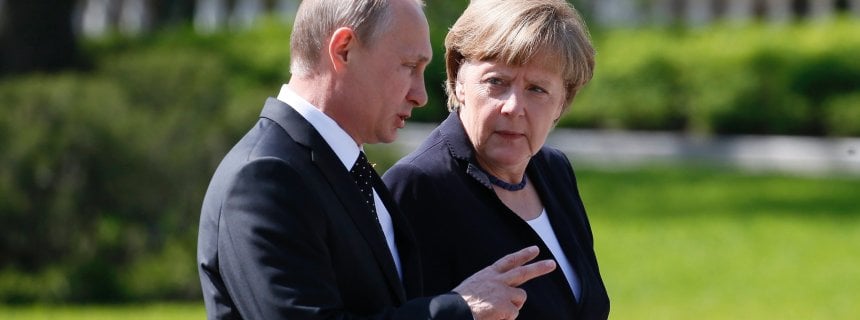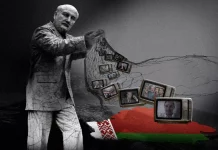
The brief disappearance of a girl in Germany recently become an international political issue. Russia is exploiting the case for propaganda purposes as part of its strategy of a hybrid war aimed at destabilizing the West and dividing Europe, Spiegel writes.
Svetlana F. is sitting at the kitchen table in her duplex home in the Berlin district of Marzahn-Hellersdorf. A slim, 39-year-old woman, she wrings her hands as she relates what happened to her daughter more than three weeks ago. The conversation stops each time she is unable to hold back her tears. This will be her only interview with the media.
“My daughter,” says the mother, “is not doing well.” When SPIEGEL and SPIEGEL TV met the family a week ago last Thursday, the girl was in the hospital. “She has been in the psychiatric ward since Monday.”Nothing has been the same for the family since the 13-year-old girl disappeared one morning on her way to school. The case has become an international political issue since it was picked up by Russian media and Foreign Minister Sergey Lavrov attacked the German authorities investigating it.
As the saying goes, truth is the first casualty of war. This is especially true of the propaganda war Moscow has been waging against the West and its open societies since the crisis in Ukraine began. The 13-year-old girl and her disappearance have become a weapon in this war. According to the Russian version of the story, the case has all the necessary ingredients: the rape of a teenage girl, violent refugees, police that use political correctness as an excuse not to investigate and politicians who are afraid of the truth. This is the story Moscow is telling, regardless of the facts.
Russia Accuses Germany of ‘Cover-Up’
The Kremlin is now portraying itself as an advocate for the girl. The Russian Embassy in Berlin sent a verbal note to the German Foreign Ministry at the beginning of last week. The letter, with one page written in Russian, contains the usual pleasantries, but the overall tone is aggressive. The Russian diplomats demanded that the case be fully investigated, adding that they did not understand why the matter was being kept quiet.
On Tuesday, Lavrov publicly accused the German authorities of a “cover-up,” saying they were “whitewashing reality to make it politically correct.” German Foreign Minister Frank-Walter Steinmeier reacted sharply, calling Moscow’s reaction “political propaganda.” On Wednesday, Russian Ambassador Vladimir Grinin was summoned and lectured on the status of the investigation.
Nevertheless, as the propaganda battle continued, the version in which the girl was allegedly raped still circulated on the Internet. Security experts believe that Russia has greatly expanded its propaganda campaigns against the West, including Germany, in recent years. They represent the Kremlin’s attempt to manipulate public opinion in the West, stir up conflict and destabilize Western societies. President Vladimir Putin, a former KGB agent, and his team are using tricks from the intelligence agency’s playbook to conduct foreign policy. The “old methods” of the KGB — disinformation and destabilization — are blatantly on display once again, says Hans-Georg Maassen, president of the Federal Office for the Protection of the Constitution (BfV), Germany’s domestic intelligence service.
These methods were already evident in the Ukraine crisis, as Russia deployed television stations and so-called trolls to spread propaganda on the Internet and cast aspersions on Western media for being kept on a tight leash. Russian propaganda falls on fertile ground in the West, where distrust of politicians and the media is widespread. Many believe that the established media, disparaged as the Lügenpresse, or “lying press,” are withholding the truth. In Germany, 44 percent of the population harbors such reservations, according to a survey by the polling company Forsa.
Stirring Up Resentment
The refugee crisis provides Moscow with an issue that is even better suited to divide German society. Russian propaganda portrays the West as having been infiltrated by too many foreigners, making it unable to guarantee the safety of its citizens. It stirs up resentment against refugees and migrants and attempts to undermine confidence in democratic institutions and the established media.
This is all part of a strategy to both discredit and weaken the West. Russia sees this as necessary to safeguard its interests. Since the demise of the Soviet Union, the Kremlin has been on the defensive. In Moscow’s eyes, the West gained the upper hand in the 1990s, both militarily through NATO’s eastward expansion, and in propaganda terms by portraying Western democracy as the only attractive form of government. To counter the pre-eminence of the West, Moscow has shifted to guerilla tactics in an attempt to undermine the West.
This includes cyber attacks, like the one on the German federal parliament, the Bundestag, last year, “little green men,” the armed men in unmarked army uniforms that Moscow deployed in Crimea, and propaganda. Experts refer to such a strategy as “hybrid warfare” — war without a formal declaration, rules or borders. The belligerent is anonymous, does not identify itself and often operates invisibly. Rather than weapons, fighting is done with words. The Internet is the most important battlefield.
Chancellor Angela Merkel has long seen the vulnerability of Western societies as a serious threat. She is worried about how quickly Western societies become unsettled, she said at the Munich Security Conference last year, noting that the West must “address the issue of hybrid warfare with the utmost urgency.”
Fomenting Unrest
For Moscow, ethnic minorities are an easy tool to use in fomenting unrest. Russia sees itself as a protector of all ethnic Russians living abroad, which it used as a pretense to invade Crimea and support the separatists in eastern Ukraine. According to Western intelligence services, Moscow is also active in the Baltic countries, where there are Russian minorities. Now, it seems, the Kremlin sees German-Russians as its citizens as well. Foreign Minister Lavrov referred to the girl from Marzahn, who has Russian and German citizenship, as “our girl.”
Her case went on file at 6 p.m. on Jan. 11, when her parents, who emigrated from Russia in 2004, reported their daughter missing. The missing persons department of Berlin’s Criminal Investigation Division took over the case and initiated a search for the girl.
Soon afterwards, a flyer printed by the family that had been handed out in Marzahn-Hellersdorf appeared online. It read: “She is 1.55 meters (5’1″) tall and has brown hair and greenish-brown eyes.” The 13-year-old was supposedly missing for 30 hours.
Since the latest edition of SPIEGEL went to print, the Berlin police have been able to clear up this mysterious case of alleged kidnapping and rape. As it turns out, the girl was simply with a 19-year-old German acquaintance during the time in question. Prosecutors say the girl had apparently decided to hide at the friend’s apartment because of problems at school and later invented a story to explain her absence.
And when it came to creating an alibi, she did not skimp on the details. According to Svetlana, her mother, the girl returned home on Tuesday afternoon. “She was wearing a bra, leggings, shoes and a jacket,” says the mother. “Her T-shirt, cardigan and backpack, wallet and ring were gone. She was crying, and she had scratches on her face, bloody lips and a bruise on her nose.”
At first, the girl told her mother and the police that three unknown, Mediterranean-looking men had pulled her into their car while she was standing at a streetcar station and had taken her to an apartment, where she claimed she was abused and raped. Svetlana says her daughter told her that the men did not speak German.
Internet Rumors
But once the police ordered a medical examination of the girl, no injuries were found that matched her account. They were also able to rule out the possibility of the rape she had described. But that didn’t stop rumors from surfacing on the Internet and spreading like wildfire.
By Thursday morning, a xenophobic website read: “At least 5 foreigners rape missing girl for 30 hours! Police release no information about this crime.” Members of Germany’s far-right National Democratic Party (NPD) disseminated the website’s story in Marzahn-Hellersdorf. Real and supposed details of the case were mixed together, and soon there was talk of “Arab men.” The story attracted attention, especially among right-wing extremists and German-Russian immigrants.
The next day, the girl and her mother were asked to come to the Criminal Investigation Division in Berlin for more questioning. At 9 a.m., they found themselves sitting across from investigators once again. “I asked to be present when my daughter is questioned,” says the mother. That would not be possible, she claims the officers then told her — an allegation the police deny. Instead, they say that while the 13-year-old was questioned alone, it was with her mother’s consent.
The mother claims that two officers, a man and a woman, questioned her daughter for more than three hours. According to sources close to the investigation, once the 13-year-old retracted her rape accusation, she told the officers she had been in contact with men she already knew.
Based on the girl’s statement, the investigators later interrogated two men of Turkish or German-Turkish origin, both in their early 20s, who had allegedly had sexual contact with the girl, albeit before she disappeared on Jan. 11. The police then began investigating the two suspects for serious sexual abuse of a child. Under German law, teenagers must be 14 before they can consent to having sexual contact.
On the day after the interrogation, there was a protest in front of the Eastgate shopping center in Marzahn. A teary-eyed young woman, who introduced herself as the girl’s cousin, gave her version of the story. “The girl really was raped, by three men,” she said. NPD agitators stood around the woman. One called for the “death penalty for child molesters.”
A Media War and Cyber Attacks
On the morning of Saturday, Jan. 23, the case appeared on the website of a right-wing group of so-called Russlanddeutsche, a term used to describe ethnic Germans who have emigrated to Germany from Russia. By that evening, Russian media had caught wind of the story, with Channel One Russia devoting four minutes to it on its nightly news program. All the major TV stations began reporting on the alleged rape and clips were circulated online, but with footage that had nothing to do with the case. One video had shots of Tahrir Square in Cairo, while another used images that appeared on YouTube in 2009.
The Berlin police reacted to the accusations with a press release stating that the girl had not been raped. There was nothing in it about an investigation into child molestation. The case presented the police with a dilemma: If it published additional information about the investigation, it would be revealing details about the private life of a child. If it did not, it could be accused of a cover-up.
Russian platforms like Sputnik and RT (formerly Russia Today) started reporting about the case in German. Then on the weekend of Jan. 23, about 700 people heeded a call by a group calling itself the International Convention of Russlanddeutsche and protested in front of Merkel’s Chancellery. The demonstration in the German capital, organized through a WhatsApp group, became a prelude to a wave of protests, with thousands of people taking to the streets over the weekend.
As the case took on a political dimension, it exposed the new nature of Moscow’s propaganda war.
European security agencies have warned for some time that Moscow is targeting public opinion in European Union countries. Kremlin-controlled broadcaster RT disseminates news and videos online in English, Russian, Spanish, French and Arabic, and with great effectiveness. The German-language channel alone already has more than 170,000 likes on Facebook, while the English version has 3.3 million. The state-owned broadcaster has a budget of more than €200 million ($222 million). And then there are the many concealed provocateurs doing their damage on the Internet, as well as other press organizations controlled by the Kremlin.
Moscow is also trying to gain influence on German channels. For instance, last August German radio stations received a tempting offer from Russia to buy one to two hours of airtime a day, or “several news segments, each 20 minutes long.” Behind the offer was Sputnik, the Russian media portal that, in 30 languages, it “tells the untold.”
Like RT, the German branch of Sputnik — named after the satellite that established the Soviet claim to supremacy in space almost 60 years ago — is part of the Rossiya Segodnya media empire. Its mandate is to broadcast Moscow’s worldview at Putin’s behest. Dmitry Kiselyov, the Kremlin’s chief propagandist, serves as Sputnik’s general director. The only Russian journalist on the EU sanctions list against Moscow, he sees himself as being involved in an “information war.” In fact, he says, this is the “primary form of warfare” today.
The building that houses companies manipulating social networks and websites on behalf of the Kremlin is located on the northern outskirts of St. Petersburg. Until recently, the yellow sandstone building also housed the offices of the Agency for Internet Studies. More than 400 employees, known in Internet jargon as trolls, write blog entries or comments for news and other websites. Sometimes they agitate against members of the Russian opposition, and sometimes against the United States, but for the most part they praised the Kremlin’s policies in general and Putin in particular. “After the 2012 mass protests, troll factories sprung up all over the country, where hundreds of young people were paid to post comments and messages that help the Kremlin,” says journalist Lyudmila Savchuk, who went undercover in the St. Petersburg agency.
The trolls who triggered alarms in the United States when hundreds of tweets reported an alleged chemical accident in a Louisiana factory on Sept. 11, 2014 were likely also based in St. Petersburg. The coordinated campaign was a fake, but it felt like a test run for future, larger-scale disinformation campaigns. A reporter with the New York Times followed the initiators of the 2014 Twitter campaign to 55 Savushkina Street in St. Petersburg.
German authorities now “clearly attribute” last year’s major hacker attack on the German Bundestag to a “Russian military intelligence agency,” as a senior security official told SPIEGEL. According to the official, there were a number of attacks following the same pattern in recent years, targeting German defense companies and other NATO countries. The German federal prosecutor’s office in the southwestern city of Karlsruhe launched an investigation on Jan. 15 into the possible involvement of intelligence agents in the incident.
The Federal Office for the Protection of the Constitution discovered the attack on the Bundestag on April 30. The hackers had gained access to 14 Bundestag servers, including the main server, which contains all access data to the German parliament. It is still unclear exactly which information the hackers stole from the Bundestag network. But one thing they did achieve with the attack was to unnerve German lawmakers, which led to conflict and mistrust between parliamentary groups and the Bundestag administration.
Russia’s New Global Conservatism
In addition to cyber attacks and propaganda, Russia also uses political networks to pursue its disruptive actions in the West. In contrast to the past, the pro-Moscow camp abroad is no longer leftist but staunchly right-wing. Russia sees itself as the leader of a new, global conservatism — anti-liberal, xenophobic and homophobic — against a supposedly decadent West and its decline in values. Moscow uses right-wing groups to advance its agenda.
“The structure is ideologically based on the expansionist neo-Eurasianism of Alexander Dugin,” says a report by the Czech intelligence agency BIS. Dugin, a professor in Moscow, dreams of a worldwide “conservative revolution.” He is an adviser to the president of the Russian parliament and a frequent guest on Russian television, and he is seen as Putin’s mentor. The Russian General Staff use Dugin’s book, “The Foundations of Geopolitics,” as a textbook for aspiring officers. Dugin’s goal is to unite right-wing forces in Europe under the banner of a Eurasian movement.
The project has been underway for some time. In September 2014, France’s far-right Front National received a multimillion-euro loan from a Russian bank run by Putin loyalist Roman Popov. Heinz-Christian Strache, chairman of the right-wing populist Freedom Party of Austria (FPÖ), attended a conference hosted by a Russian oligarch. And the Russian government has also shown a strong interest in the Alternative for Germany (AfD), a far-right German political party.
In late 2014, deputy AfD leader Alexander Gauland and the party’s spokesman paid a visit to the Russian Embassy along Berlin’s Unter den Linden boulevard, where the Russian envoy proposed a cooperation with the AfD. When SPIEGEL reported on the meeting, the AfD’s chairman at the time, Bernd Lucke, expressed outrage and distanced himself from the plans.
A year later, after Lucke had long since been ousted, the party issued press releases about meetings and cooperative agreements with Putin’s representatives in Berlin. Members of the AfD youth organization, Young Alternative, attended pro-Kremlin conferences in Ukraine and Serbia (one conference was titled “Donbass: Yesterday, Today and Tomorrow”). The party plans to host a “security policy seminar” in Potsdam in June — together with the Russian Embassy, which AfD officials say is covering part of the costs. The working title of the conference: “Migration as a Destabilizing Element.”
The Russians also seem to have no qualms in dealing with German neo-Nazis. Udo Voigt, a representative of Germany’s far-right NPD in the European Parliament, attended a conference in St. Petersburg in March 2015, at the invitation of the Rodina (“Fatherland”) Party of Russian Deputy Prime Minister Dmitry Rogozin. In November 2014, two NPD officials attended a “Compact” conference with the motto “Peace with Russia.” It was organized by a man named Jürgen Elsässer.
A former Communist, Elsässer is one of the most zealous Putin propagandists in Germany. At the conference in Berlin’s Maritim Hotel, an audience of 700 people listened to his assertion that Brussels, not Moscow, was the capital of the “new USSR.” The guests included NPD officials, AfD deputy Gauland and Oskar Freysinger, a politician with the right-wing populist Swiss People’s Party (SVP). Another attendee was Vladimir Yakunin, a Putin confidant and former head of Russia’s state rail company.
“There are increasingly obvious ideological connections between several extremist right-wing parties in Europe and the current Russian leadership,” the Hungarian research institute Political Capital wrote in an extensive study. There are several aspects of present-day Russia that appeal to extremists: a strong leader, the suppression of civil rights and liberties, state control over strategic sectors and the constant emphasis of national interests.
Moscow’s Foot Soldier
Now the Kremlin is apparently setting its sights on Germany’s Russlanddeutsche community. Years ago, efforts were made to gain their support for right-wing extremist organizations, such as through the International Convention of Russlanddeutsche. The body’s chairman, Heinrich Groth, is currently in great demand. On a recent Thursday afternoon, he was walking through a high-rise apartment subdivision in Berlin’s Hellersdorf neighborhood with his phone to his ear. TV networks, radio stations and newspapers all want to know what Groth has to say about Germany’s refugee policy, New Year’s Eve in Cologne and the case of the 13-year-old girl.
About 2,000 Russlanddeutsche are members of Groth’s “Convention,” which doesn’t seem like much when compared to the 31,000 Russian-speaking ethnic German immigrants in all of Berlin. But Groth behaves as if he represents them all. He is in close contact with the Russian government, he says. Before the demonstration on Jan. 23, he traveled to Moscow to inform the Russian media about the case, as he claims. “We are not about to take this lying down. We are all at risk because of the millions of immigrants,” says Groth.
It is with the help of people like Groth that Moscow can wage its hybrid war in Europe. Valery Gerasimov, chief of the Russian General Staff, described the “new asymmetrical conflicts” at length in a keynote address at a military academy in Moscow in January 2014. Moscow feels threatened, not just by NATO’s expansion eastward, but also by democratic revolutions, which Moscow sees as a plot by the West to expand its sphere of influence.
“The distinctions between war and peace are becoming blurred in the 21st century. Wars are no longer declared, but are simply begun and then no longer follow familiar models,” Gerasimov explained. Within a few months and days, he added, a previously stable country could become the arena of a bitter armed conflict and the victim of foreign intervention. “The state is plunged into chaos, a humanitarian catastrophe and civil war,” Gerasimov said. He cited as proof the Arab Spring and the methods used by the United States and the West, according to Russia’s analysis, to overthrow the rulers of countries like Egypt and Tunisia.
Europe’s Anti-Propaganda Strategy
The West takes the threat from Moscow’s hybrid war seriously. Both NATO and the European Union have concentrated on the issue for about a year. Gabor Iklody is very familiar with both institutions. From 2011 to 2013, the Hungarian career diplomat worked at NATO headquarters in Brussels, where he addressed “new security challenges.” Now he heads the Crisis Management and Planning Directorate at the European External Action Service. His team, along with other experts at NATO headquarters, is tasked with analyzing the new threat situation. According to a confidential NATO document, adversaries are trying to exploit a country’s vulnerabilities.
The East StratCom Task Force, a sort of counter-propaganda department of the EU, is expected to play a key role in defending against Russian objectives in the future. But the team, which began its work in September 2015, seems tiny in comparison to the Kremlin’s media machine. It has only 10 people working for it and doesn’t even have its own budget. So far, the task force has only produced a sparse website, which publishes a weekly “Disinformation Review” — a table of Russian propaganda messages, which are summarized in one or two sentences and debunked just as briefly.
For the past year, NATO has also been trying to bundle the knowledge of its member states in the propaganda war. It has established a Center of Excellence in the Latvian capital Riga, where strategies in the propaganda war are analyzed and countermeasures developed. The effort against Moscow’s strategic communications is called “Stratcom Defense,” but it is still in its infancy. The center has only about 20 employees and is temporarily housed in an old courtyard building in downtown Riga.
The perfidious aspect of Moscow’s strategy is that by spreading so many targeted lies, it has a “boy who cried wolf” effect. It blurs the lines between what is real and what is fabricated. Rather than try and beat its opponent in its battle for the truth, Russia simply sabotages the whole game. “Russian propaganda does not put out one version of a story but many, and in doing so it pollutes the realm of information,” says an EU insider. “In the end, people no longer believe any version” — including the one that’s true.This is the weakness of democratic, pluralistic societies. In a democracy, the state organizes the contest for the truth instead of dictating it. The system is based on trust and the power of persuasion, and it is relatively powerless to protect itself against abuse. It has no other choice but to continue championing the search for the truth.
“Our goal is to bring the truth to light,” says NATO Secretary General Jens Stoltenberg. “We believe that critical journalism and an open political debate are the best ways to counteract propaganda.”
By Melanie Amann, Markus Becker, Benjamin Bidder, Hubert Gude, Konstantin von Hammerstein, Alexej Hock, Christiane Hoffmann, Martin Knobbe, Peter Maxwill, Peter Müller, Gordon Repinski, Sven Röbel, Anna Sadovnikova, Matthias Schepp, Jörg Schindler, Christoph Schult, Spiegel





